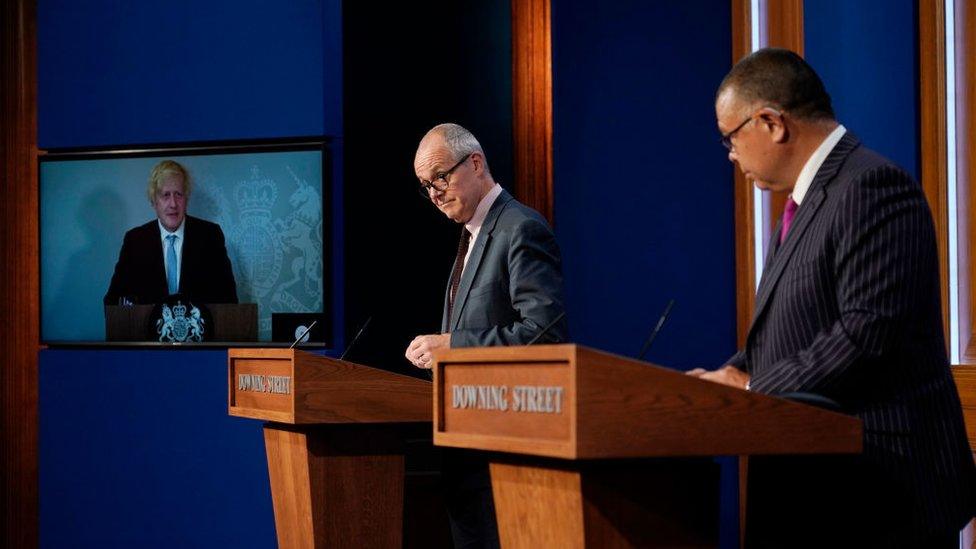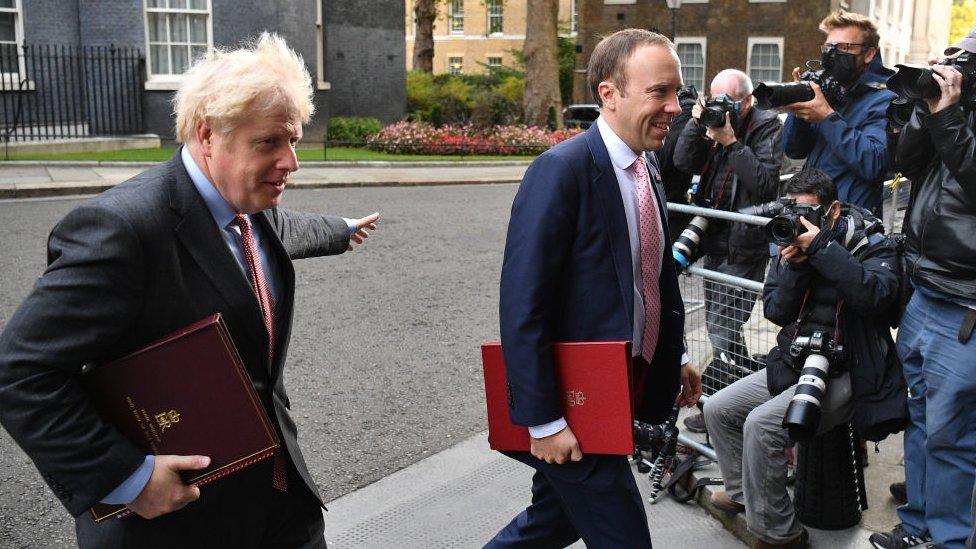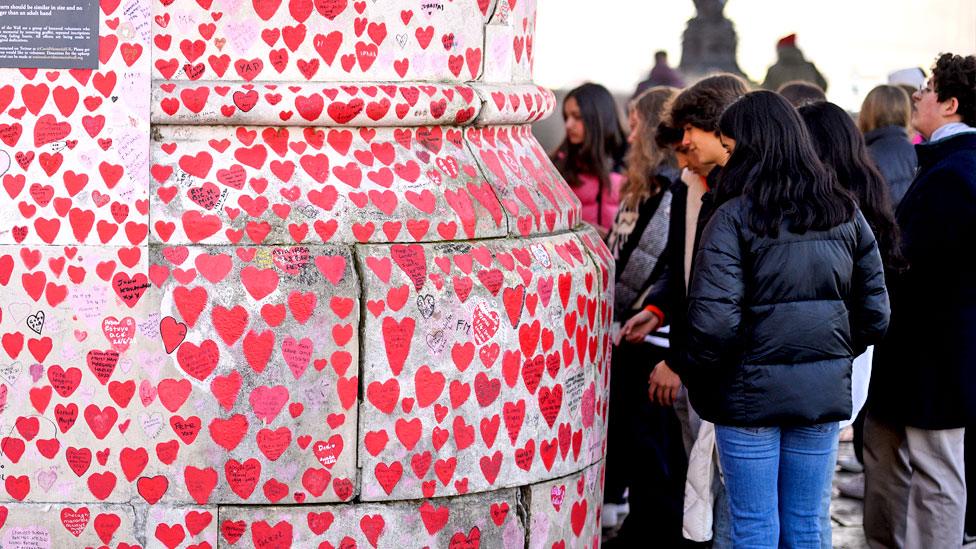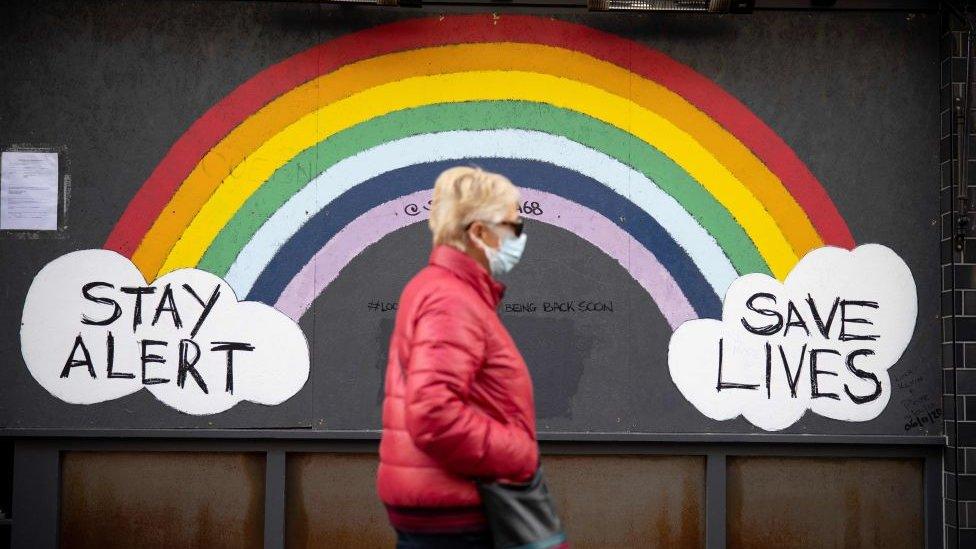Sir Patrick Vallance criticises Boris Johnson's 'impossible flip-flopping'
- Published

Sir Patrick Vallance (centre) was a regular participant in televised news conferences during the pandemic
The government's former chief scientific adviser criticised Boris Johnson's "impossible flip-flopping" and "bipolar decision-making" in diary entries released to the Covid inquiry.
Sir Patrick Vallance also wrote of "chaos as usual" in Downing Street after a meeting on social-distancing.
The entries were read out at the start of stage two of the inquiry, which will examine the political decision-making.
The government has said it acted to save lives and protect the nation.
Mr Johnson will give evidence in person to the inquiry later this year, along with other ministers, advisers, civil servants and health officials.
Sir Patrick served as the government's chief scientific adviser from 2018 to 2023 and was a familiar face at the podium for Covid news conferences.
Extracts of daily diaries he wrote during the pandemic were read out by the inquiry's lead counsel, Hugo Keith KC, as part of his opening statement on Tuesday.
In one note Sir Patrick wrote: "Number 10 chaos as usual.
"On Friday, the two-metre rule meeting made it abundantly clear that no-one in Number 10 or the Cabinet Office had really read or taken time to understand the science advice on two metres. Quite extraordinary."
In other entries Sir Patrick described how he felt scientists were "used as human shields" by ministers.
On 19 September 2020, around the time a possible "circuit-breaker" lockdown was being discussed, he wrote: "[Johnson] is all over the place and so completely inconsistent. You can see why it was so difficult to get agreement to lock down first time."
Meanwhile, long Covid support groups said Mr Johnson used colourful language to describe the condition in October 2020.
Speaking on behalf of the groups, Anthony Metzer KC said that when the Department of Health and Social Care (DHSC) was publishing guidance for people with long Covid the former prime minister dismissed it as "bollocks".
"Mr Johnson has admitted in his witness statement that he didn't believe long Covid truly existed, dismissing it as 'Gulf War Syndrome stuff',"Mr Metzer said.
'Toxic atmosphere'
Mr Keith also said WhatsApp exchanges between ministers and advisers in Downing Street painted a "depressing picture" of factional infighting and a "toxic atmosphere" during the pandemic.
He said messages showed "disharmony" between Number 10 and the DHSC, and contained repeated references to Mr Johnson's loss of confidence in former Health Secretary Matt Hancock.
"It appears to be the case that the prime minister and a number of officials and advisers held him in low regard," said Mr Keith.
"In particular, on account of his apparent tendency to get over-excited and then make stuff up."

The inquiry has now received messages from more than 250 different WhatsApp groups in addition to thousands of pages of one-to-one chat conversations, Mr Keith confirmed.
Prime Minister Rishi Sunak told the BBC in an interview that "of course" he was helping the inquiry after it was claimed he was unable to provide some of his messages after swapping his phone a number of times.
The Guardian newspaper had reported that he had written in a witness statement that he did not have access to the messages because he did not back them up.
At the Conservative Party conference, Mr Sunak said: "This is the legal inquiry, there's a full process. I submit a lot of different evidence and documentation. I will be interviewed. All of that will be transparent and public.
"And of course I'm helping with all of that, as people would expect. We want to learn the lessons from Covid."
The Guardian also reported that Mr Johnson had been unable to access messages sent earlier than 7 June 2020 because of an unspecified technical issue.
The Covid-19 Bereaved Families for Justice group said the loss of these messages was a "remarkable and unfortunate coincidence" and called for experts to examine the phone to see if the messages could be recovered.
Mr Keith told the hearing that although it was right to say the inquiry had not received all the messages asked for, "we have a very good picture of what happened".
"There are unlikely to be any hidden corners which have escaped the inquiry's attention," he added.
- Published3 October 2023

